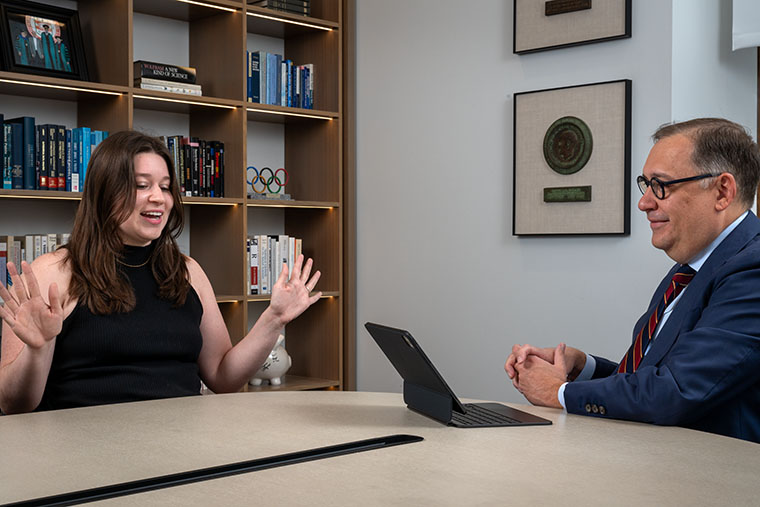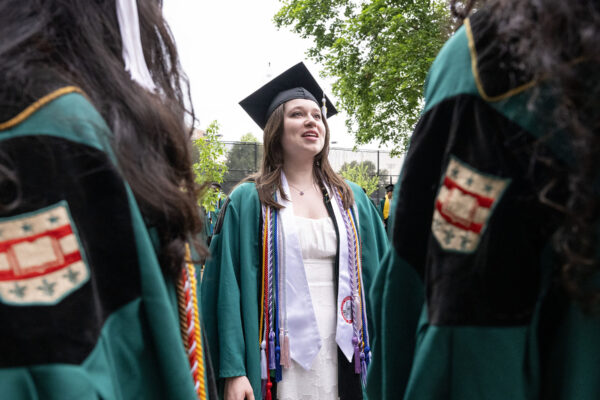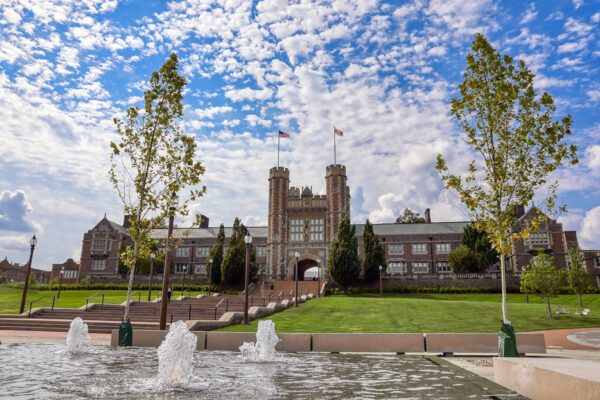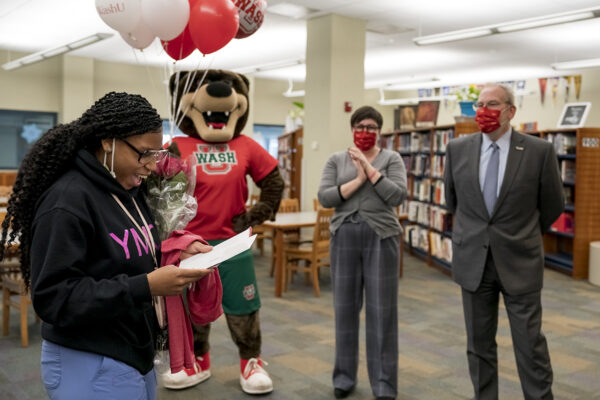The WashU Pledge, the bold scholarship initiative Chancellor Andrew D. Martin unveiled during his inaugural address in 2019, provides all Pell-eligible admitted students from Missouri and southern Illinois a free WashU education — tuition, housing, food, fees, books, even money for a laptop. For Julia Blanchard, AB ’24, who was among the first cohorts of graduates of the WashU Pledge, it provided one other priceless benefit: confidence.
“I remember feeling this burst of relief,” Blanchard says. “The pledge gave me the confidence that I could do this on my own without putting a financial strain on my family. That was really important to me.”
Shortly after Commencement, Chancellor Andrew D. Martin interviewed Blanchard in his office to learn more about her studies in Arts & Sciences and the Brown School, her work in the Taylor Family Center for Student Success, and her plans to open a nonprofit in St. Louis. Blanchard, in turn, had a few questions of her own.
Chancellor Martin: When we first conceived of the WashU Pledge, our immediate goal was to provide financial resources to talented students from Missouri and southern Illinois. But we also wanted to make sure that every student got the full WashU experience. What did that look like for you?
Blanchard: In the broadest sense, the WashU Pledge gave me time. I had time to do things on campus like join the powerlifting club. Don’t get me wrong — I still held jobs. But I was saving for my future, which is very different from worrying day-to-day about my bills.
Tell me about your roles in the Taylor Family Center.
My first role was as a mentor for five first-year students. My junior year, I worked with the amazing Annie Kelly, assistant director in the Office for Student Success, who helped us create different cohorts. I started the center’s LGBTQ+ cohort, and we had monthly meetings where we talked about different issues. There are plenty of LGBTQ+ students on campus, but being LGBTQ+ with a limited income and/or being first-generation is a whole different experience. My senior year, I was the senior assistant for programming and developed programs to prepare students for life post-graduation.
So you’ve graduated with your bachelor’s degree, and, through the Brown School’s 3-2 program, you’re staying with us to earn your master’s of social work. Why did you decide to enroll in the Brown School and what are your goals?
Honestly, the main reason is because I was a pledge student. I don’t know many opportunities where you get to have your first year of your master’s covered. Before I came to the Brown School, I had a narrower idea of social work. I was interested in sex and relationship therapy, and I wanted to open a practice working with queer individuals. Then I learned about the social impact leadership concentration, which has really shaped my career goals. Right now, I’m starting an initiative called Collaboration Center STL, which is an LGBTQ+ community center. Springfield has a LGBTQ+ community center; Kansas City has one. And the people of St. Louis deserve one, too.
You’ve built a relationship with a great friend of the university, Emeritus Trustee Maxine Clark, who has helped catalyze nonprofits of all different types. What has it been like to build a relationship with Maxine?
That relationship came about because of the Taylor Family Center, which connects students to mentors based on their interests. I put my interest down as “nonprofits,” and the next thing I know, I’m paired with Maxine! Our first meeting was two-plus hours at Shake Shack. Since then, she’s introduced me to a lot of influential people. COVID kept a lot of us on campus, and my class got used to it. So I’m really grateful to Maxine for pulling me off campus and connecting me to people who could help me — and whom I could help.
What advice do you have for me as chancellor as we continue this work to make WashU a place where every student, regardless of their background, can thrive?
The team at the Taylor Family Center is amazing; any student will tell you that. So my advice would be to continue to invest in that program because it really is making an impact. Before we go, can I ask you a couple of questions?
Sure.
Turning the table
Blanchard: So where did the idea for the WashU Pledge come from?
Chancellor Martin: The WashU Pledge has two different genesis stories. One dates back to 2014, when The New York Times wrote about the least socioeconomically diverse universities. And we won. We were the worst. WashU decided to do the right thing. By the time I returned to WashU from the University of Michigan, our former chancellor, Mark S. Wrighton, and his team and the Board of Trustees had made real progress.
But we were still not in a leadership position like we are today. We knew we needed to expand what was then called the Deneb Stars program. We knew we wanted need-blind admissions, which we accomplished in 2021. And we knew that, in addition to providing financial resources, we needed to better communicate the many opportunities here. For that, we turned to social science.
At the University of Michigan at the time, there was a professor who specialized in educational equity named Susan Dynarski (who is now professor of education at the Harvard Graduate School of Education). She conducted a field experiment in which one control group of lower-income students was told, “Please apply to the University of Michigan. We have very generous financial aid.” The other group was told, “If you get admitted, you come free of charge.”
It was the same financial package, but they used the language “free.” And, duh, those students were more likely to apply and, once admitted, enroll. So, for the WashU Pledge, we used the language of “free” and made it really clear who qualifies. As expected, we saw an uptick in students who applied and enrolled.
So where does the university go from here?
We’ve been working with alumni and friends to advance Make Way, our student fundraising initiative. We recently adopted a no-loan financial aid policy for all undergraduates, and thanks to the generosity of our amazing donors, we are getting close to where we need to be in terms of our financial aid packages. The next step is programmatic.
For example, the Center for Career Engagement is working to ensure that every student who qualifies has a funded, meaningful internship for three summers. There are other areas, like study abroad, where first-generation and limited-income students are still hitting bumps that we need to address. But I can tell you this: Everyone, from the Board of Trustees to the administration to the faculty to the staff, is aligned that we should be doing this. I’m not sure that was the case 15, 20 years ago, but it certainly is now.




Comments and respectful dialogue are encouraged, but content will be moderated. Please, no personal attacks, obscenity or profanity, selling of commercial products, or endorsements of political candidates or positions. We reserve the right to remove any inappropriate comments. We also cannot address individual medical concerns or provide medical advice in this forum.